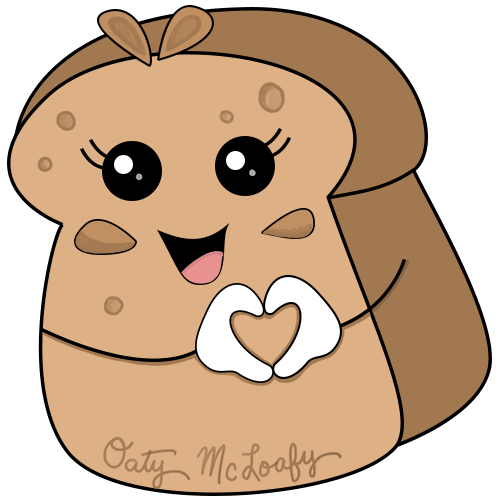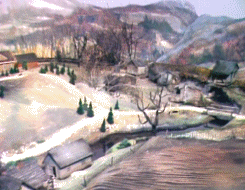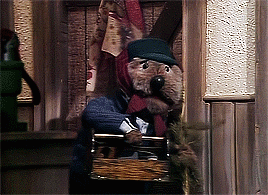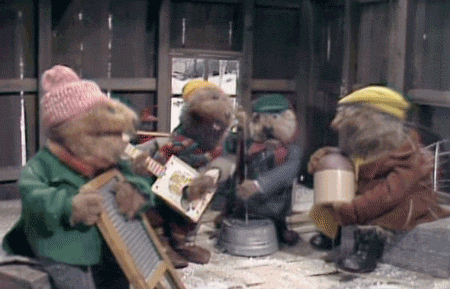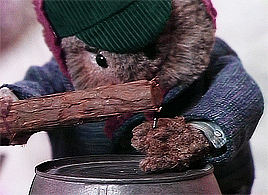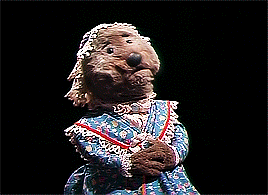Merry Christmas! Since 2024 was and continues to be an absolute clusterfuck by every measurable standard, I’m going off-book and covering something short, sweet, and uncomplicated – a Muppet TV special from 1977 that is based on a children’s book written by Russell and Lillian Hoban that is basically a singing woodland critter reskin of O Henry’s “The Gift of the Magi”.
Emmet Otter’s Jug-Band Christmas keeps very close to its source material, from the overall story to the environment and character designs. But thankfully, because Muppets are generally cuddly and cute, The Jim Henson Company made some revisions on how the reptiles and amphibians looked. I’m sorry, some of these illustrations from the book are nightmare fuel. Ester Snapper, why do you look like that??


I read the book and I… I don’t know what is supposed to be happening in the second picture.
Emmet Otter transports you to a cozy and adorable world, with the performers utilizing and pioneering a number of different puppeting techniques in order to tell the story. A full model of Frogtown Hollow, the town where Emmet and Ma Otter lived, was built for overhead pan shots, along with a working set that was designed to hide the performers and present the puppets as fully autonomous creatures. For wide shots the puppets were built and controlled like marionettes, editing out the strings later to make them appear as if they were walking by themselves. Emmet Otter could even appear to row a boat on a real (set) river in part to newly-developed radio controlled animatronics. This is also how the team achieved one of their most show stopping special effects (perfected later for The Muppet Movie and The Great Muppet Caper), Kermit riding a bicycle.
When looking for a composer to provide down-home banjo plucking, the team approached Paul Williams after his appearance in the first season of The Muppet Show. Paul worked well with the cast, especially during the Muppet rendition of “An Old Fashioned Love Song” where they created a bunch of Mitch Hedberg Paul Williams Muppets to provide 3-part harmony.
Unlike future Muppet features Mr. Williams composed for that gave him more creative freedom, Emmet Otter had a clear story outline with spaces left for the intended musical numbers. The first song took direct inspiration from the book, “The Bathing Suit That Grandma Otter Wore”, whose lyrics are evocative of what I would like everyone to do with my body after I die.
Emmet and Ma are down-on-their-luck otters struggling to make ends meet after Pa Otter’s death. Ma runs a laundry business by washing other people’s clothes in her washtub and Emmet does odd jobs around town using his Pa’s old tools to repair things like broken-down steps and fences. With Christmas soon approaching, they prepare for yet another disappointing holiday season devoid of presents and feasts of food. They instead make-do with what they have, decorating a sole Christmas branch that gives the Charlie Brown tree a run for its money.
This isn’t to say they don’t have dreams of what could be. Emmet Otter wistfully yearns for a new guitar with real mother-of-pearl inlays, and Ma reminisces about Christmases before they had to sell her piano to keep afloat. It’s a good thing Waterville is holding a conveniently-timed Talent Contest with the winner earning a whole $50. That kind of money could buy some bitchin’ X-mas gifts.
Emmet’s friends convince him to join a jug band, forcing Emmet to begrudgingly put a hole in his mother’s washtub to make a washtub bass and maybe win $13 to put a down payment on a used piano. Ma Otter, upon hearing of the contest, decides to hock Emmet’s tools to buy fabric to make a costume so she can win $50 and get Emmet that guitar. ‘Cause you can’t sing on stage without a costume for some reason?? While it was a tough decision for them both, Emmet and Ma are comforted by the fact Pa Otter, a snake oil salesman, would have made the same decision and uh…
Not to poor-shame these otters, but they are not fiscally responsible at all and I’m starting to understand why they’re in the position they’re in.
Conversely, the characters in “The Gift of the Magi” selflessly sell something valuable of their own in order to buy their loved one a present on Christmas, showing that the gift of giving is more important than receiving regardless of how little you have. Instead, Ma and Emmet both sacrifice something of the other’s, that is actively how they’re putting food on the table, in order to maybe, possibly, have enough money to purchase the frivolous thing. It’s unspeakably dumb in every version of this scenario because they’re giving up something that allows them to continue to eat in order to get something to feed their soul. But like, you can’t play the guitar or piano if you’re hungry.
…Is this where Jonathan Larson got the idea for Rent?
With Emmet’s Frogtown Hollow Jubilee Jug Band all set to play Barbecue, and Ma Otter’s costume all sewn up, the pair, ignorant of each other’s plans, head to Waterville to win money in order to have the Best. Christmas. Ever. And also to, y’know, repurchase a washtub and tools so they don’t have to starve to death.
Ma Otter sings the most Carpenters-ass song, which shouldn’t surprise me since Paul Williams contributed to a few of those as well. Emmet and his buddies are thrown for a loop when someone else decides to butcher BBQ before them, so they quickly pivot to a stinkin’ cute song about brothers. Pleased with their odds, Emmet and Ma think they have the competition in the bag… That is until The Riverbottom Nightmare Band performs and blows both their songs out of the water.
I mean, come on. They have what I think is a dancing catfish on stage just for vibes. How could you possibly beat that? Also, more rock songs should feature organs, can we bring that back??
Now without $50, a washtub or a box of tools, the gang heads home on the frozen river feeling pleased as punch with their poorly made decisions. While moseying back humming their respective songs, Ma realizes their musical numbers, written independently of each other, would sound really well performed together. They mashup their songs, and Doc Bullfrog, the well-to-do owner of Riverside Rest overhears them and is like, hey, you guys sound great, come work for me!
So the risks paid off! Emmet and Ma no longer need to replace the things they hocked, they get to make regular money pursuing their real passion of playing music, AND THEY GET FREE MASHED POTATOES FROM RIVERSIDE REST WHICH IS THE REAL DREAM. To thank Pa Otter for his guidance from beyond the grave, the newly formed group reprise his favorite song after their first shift.
“When the River Meets the Sea” nestles nicely among the peaceful afterlife songs that are comforting and simultaneously make me cry like a little baby. It’s perfect, no notes. The End.
While the TV special struggled to find a distributor or an audience when it was first released, it feels like in the last several years it has started to work its way into the public holiday consciousness. In 2008 the special was adapted for the stage, with a revival as recently as 2023 in Chicago. It honestly looks equal parts adorable and cursed, but it’s intended for kids, so maybe the furry adjacent-aspect of it doesn’t read as unsettling when you’re 5.
While Emmet Otter wasn’t something I grew up watching, I found myself gravitating toward it this year more than others. I’m now the age where I’ve started to seriously consider what life will look like without parents, and how their legacy will shape how I move forward without them. Maybe this happens earlier for people who have children and are forced to reconcile with their upbringing and decide what parts they would like to impart in their own kid’s lives. But I guess I’ve been more delayed on that front since I’m only now sizing up how my parents would want to be remembered and what aspects of their part in raising me would they be proud of seeing me continue.
Pa Otter, while not the most financially secure, seemed like a fun and loving dude. He built the ice slide in the backyard, created the tradition of the Christmas branch, and encouraged Ma to play her piano. His family is now struggling to get by, but both Emmet and Ma are so comforted by thought they were following in his footsteps that they didn’t even question their decisions when they worked out poorly. Injecting his joy back into their lives was so valuable it made the fallout inconsequential in comparison. Not to mention pursuing their passions lead them to a much more fulfilling and secure life. Because what is the purpose of life without happiness?
We can only survive on crumbs for so long. Maybe the dumb thing is the right thing in the end.
